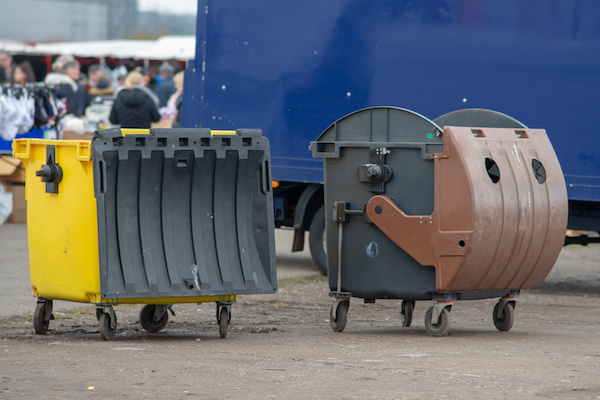Event waste management can be a challenging and costly part of planning an event. But whether it is a festival, concert, county shows, equine event, or any other type of gathering, your event will generate a significant amount of waste. Probably more waste than you predict. So, with a growing focus on environmental sustainability, how can you manage your event waste? What event waste management strategies can you implement to minimise the environmental impact your event has?
This guide will explore the key components of successful event waste management in the UK. It will offer ideas and provide solutions to help you manage waste effectively and promote a sustainable gathering.
Event Waste Statistics
According to data from 2019, UK music festivals generated approximately 25,800 tonnes of waste. This is a growing figure and, scarily, only a very small percentage of this is recycled.
Due to the nature of events being temporary, their infrastructure can’t usually cope with the waste created by their large crowds. Events usually don’t or aren’t able to offer recycling, with only a handful of shows able to provide dedicated recycling stations. The Royal Welsh Showground, for example, continues to provide general waste, recycling, and dog waste bins for its events throughout the year. However, many event organisers struggle to offer this as it requires separate collection streams for different types of waste.
How To Organise Effective Event Waste Management
Pre-Event
Effective waste management has to start pre-event. Planning how you will gather, collect, and dispose of the waste crowds generate is an integral part of the event design and logistics.
You will need to consider:
1. Waste Assessment
How much and what type of waste do you expect to be generated during the event? You will need to consider how large your show is, crowd numbers, how many food and drink vendors you have, and other points where waste could be generated. Don’t forget about toilet areas and ticket booths.
2. Vendor Engagement
You will need to establish an agreement with all vendors and suppliers for your event. Encourage them to use recyclable or compostable materials and provide guidelines on what they need to do with their waste.
3. Communication
Let everyone involved in your event know what your plans are for waste management before the event happens. Consider how you’ll communicate this, whether its emails, meetings, or event signage.
During The Event

Next, you will need to consider, plan for, and execute strategies that will happen while your event takes place. This includes:
4. Adequate Bin Placement
Make sure your bins are clearly labelled with recycling and/or landfill signs throughout the event. You’ll need to make sure that they are visible and in convenient locations to encourage use.
5. Colour-Coded Systems
Consider using coloured bin systems to help crowds and waste management workers easily identify and sort waste into the appropriate bins.
6. Waste Monitoring
Arrange dedicated waste management staff or volunteers to monitor waste stations and ensure correct sorting.
Post-Event
Evaluating your event waste management plans after the event is just as important. It can help you know what to do better next time and what worked well.
You should:
7. Analyse Data
Gather data on waste volumes, recycling rates, and landfill diversion to assess the overall success.
8. Gather Feedback
If possible, collect feedback from crowds, vendors, and staff to identify opportunities for enhancing waste management practices.
9. Continuous Improvement
Use the evaluation findings to refine waste management strategies for your next event.
How To Reduce Waste At Events
One of the ways in which you might be able to improve your event waste management strategies is by minimising waste generation altogether. To do this, you can look at addressing your event’s largest source of waste, usually food, improving recycling initiatives, and partnering with waste management companies.
Using Sustainable Materials
Taking steps to eliminate or reduce the use of single-use plastics is important in becoming a greener event. Work with your food and drink vendors to promote environmentally-friendly alternatives to single-use plastics, such as reusable cups, bottles, and utensils. You could also work with vendors to serve food and drink with minimal packaging or biodegradable options.
Food Waste Management
Food waste is usually the largest form of waste at an event in the UK, so addressing it is a vital part of reducing your overall amount of waste. You could consider using strategies such as accurate forecasting, proper portion control, and donating surplus food to charities can help minimise food waste at events. However, as the event organisers, you may need to liaise with your food vendors to implement any real change in food waste.
Build A Recycling Infrastructure
One of the best ways to reduce your event waste and become greener is by providing recycling facilities. This might include separate collection points for specific recyclable materials, such as paper, plastic, glass, and metal, and labelling them clearly for the public to use. Or, for events with food vendors, arranging on-site composting can divert food waste from landfills and promote nutrient-rich soil production.
Specialised Waste Recovery
Consider working with waste management companies that specialise in event waste recovery. These companies, like Junk Hunters, can efficiently sort and process event waste to maximise recycling and composting rates. See how we are making a difference across the UK with our clearing the UK case study, showcasing our commitment to a cleaner environment.



